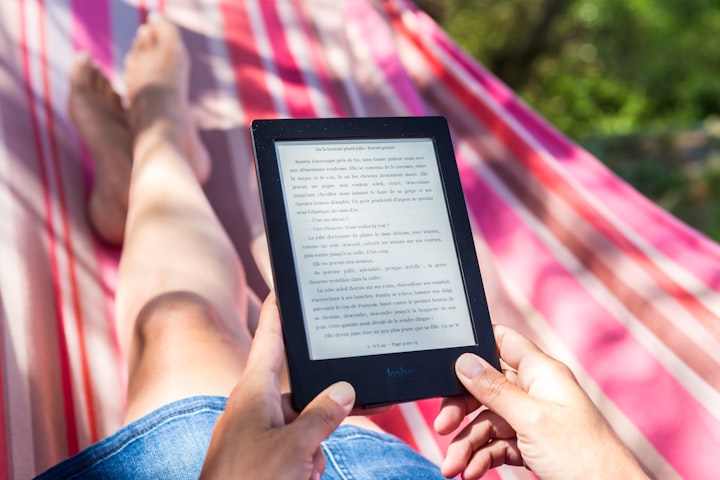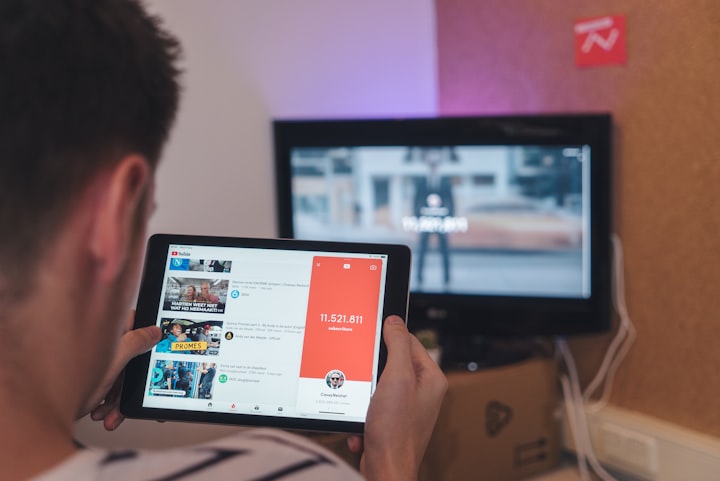E-Book or Paper Book — Which is Best?
Should I embrace technology or stay true to the tried and tested?

In today’s world of technology and gadgetry, there seems to be a device or app for everything. This, of course, is also true for the humble paper book.
From prehistoric paintings on cave walls to writing on vellum. From the first known printed text in China in the first millennium AD to the revolution and industrialisation brought about by the invention of the Gutenberg printing press in Europe in the 1450s. The recording of our thoughts has evolved since our earliest times.
With the advent of the e-book, it seems the next leap forward was already made. In 1971 Michael S. Hart typed the US Declaration of Independence into a computer and allowed people to download it. This is widely credited at the birth of the modern e-book. Hart subsequently went on to found Project Gutenberg, which even today allows the public to freely download works that are no longer within copyright or those works in the public domain. In the last twenty years, the use of e-books has grown exponentially and has come to rival even that of the traditional paper book.
E-book file formats
E-books come in many different file formats. Some companies like Amazon have their own proprietary format and others use open formats that are not constrained by requiring the use of a single app or device. ePub, txt, and pdf are good examples of such file formats.
Many e-readers and e-book apps give free access to classic literature and organisations like Project Gutenberg allow access to many thousands of out of copyright books. This is a real success story and means that as long as one has the required device upon which to view the download, the world of classic literature is open to them at no extra cost. Public libraries in multiple countries are also, increasingly enabling their members to borrow e-books in addition to their paper counterparts.
One of the things I love most about e-books is that in some cases, out of print books are made available again in e-book format only. Where it wouldn’t be cost-effective to gear up for a full print run re-paid perhaps, by a small number of sales, making a book ready for download can be a simpler and cheaper enterprise.
E-readers
The first e-reader device was the Rocket eBook launched in 1998 with an LCD screen and the capacity to hold just 10 books. This opened the door for others to follow. The first device to use the now eponymous electronic paper or E-ink was the Sony Libre which made its debut in 2004. Amazon, the company perhaps now synonymous with e-readers in the same way that Hoover is with the vacuum cleaner, perhaps surprisingly, didn’t release its first e-reader, the Kindle, until 2007. This first edition didn’t have a touchscreen but had an incorporated keyboard and scroll wheel to help make page-turning and navigation easier. There were several further iterations of such devices until the 2011 Kindle Touch and the Barnes and Noble Nook Simple Touch e-readers were released, streamlining the design and in the Kindle’s case, losing the keyboard.
Despite the ubiquitous Kindle, there are other good e-readers available today. In the UK the Kobo has the advantage of being able to view other e-book formats, whereas the Kindle directs users solely through its bookstore. The Kobo doesn’t use a single proprietary file type and so its customers can source their books from a wider array of sources and in multiple file formats.
E-book Apps
In addition to dedicated e-reader devices, consumers can also download many apps to allow them to read e-books on their Android phones and tablets, iPhones and iPads, and PCs and Mac’s. In addition to The Kindle Store and Kobo Store apps, there are Google Play Books and Apple Books apps in addition to many others, including those linked to book publishers themselves. With these apps, you can read on a much wider array of devices and so a single dedicated device is not required.

E-book Vs Paper Books
For those of us who are voracious readers space for books can be at a premium unless you are lucky enough to live in a large property or have an understanding partner. E-readers can store thousands of e-books in the space occupied by a single physical book. Space issue solved!
But that isn’t the end of the story. Reading on an electronic device won’t be for everyone. There are those, myself included, who love the tactile nature of the ‘real thing’. The touch and smell of a traditional paper book, the weight of it in your hand, the feel of the pages as you turn them. This hasn’t yet been replicated in electronic form.
E-readers today are pretty much all monochrome devices that cannot display intricate colours and accurate painting, photograph and drawing replication. Artbooks for example, where the artwork is reduced to greyscale on an e-reader, is not a satisfactory outcome. E-book apps on tablets do show colour and can have excellent picture quality, but the trade-off is battery life, measured in hours as opposed to the e-readers weeks. For some, the quality of maps, artworks, drawings and photographs in paper books vastly eclipses their representation in e-book formats. Likewise, some find no substitute for the feel and smell of a ‘real’ book.
Longevity
The length of time e-book file formats can be read is an important consideration before deciding on an e-book. What happens to your library if, sometime in the future, e-readers fall out of fashion and, however unlikely it may seem now, they are discontinued? Will you lose all of your books?
This may seem like paranoia but those of us who remember watching movies on VHS will know all too well how fickle modern technologies can be. The first VHS recorders started to appear around 1977 and spawned Video Rental businesses around the world. Anyone growing up in the ’80s and 90s will remember going out to pick the latest rentals to watch over the weekend. The advent of DVDs replaced VHS and the advent of movie downloads and streaming services is replacing DVDs. To this day I have bags of VHS movies gathering dust in my garage for want of a working device to play them on.
The Book of Kells kept in Trinity College Dublin is believed to be over 1200 years old. Would your electronic book survive even a generation or longer? I for one have several prized books that I have had for over twenty years and I wouldn’t want to simply lose them. But who can say what the future will hold?
Final Thoughts
I love to read, regardless of the medium I utilise to do so. The most important attribute for me is the quality of the work being read. That said, the huge storage capacity offered by e-readers and the libraries worth of volumes that can be held therein, make an e-reader perfect for me.
In the end, the decision is yours. Whether you decide to change to e-books or keep the paper variety will, to some degree, depend on your reading needs and your overall preference. As for me, I have embraced the e-book and I read my Kindle every day. I have not yet, however, abandoned the traditional Hardback and still hold my prized volumes dear
_______________________________________
I originally published this article on Medium in April 2021
https://medium.com/the-shadow/e-book-or-paper-book-which-is-best-9f99604d9f34
About the Creator
Paul Douglas
I have always loved to write, especially poems and short stories. I also have an abiding love for technology and gaming. I love to share my outlook with others.






Comments
There are no comments for this story
Be the first to respond and start the conversation.